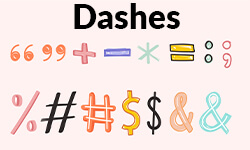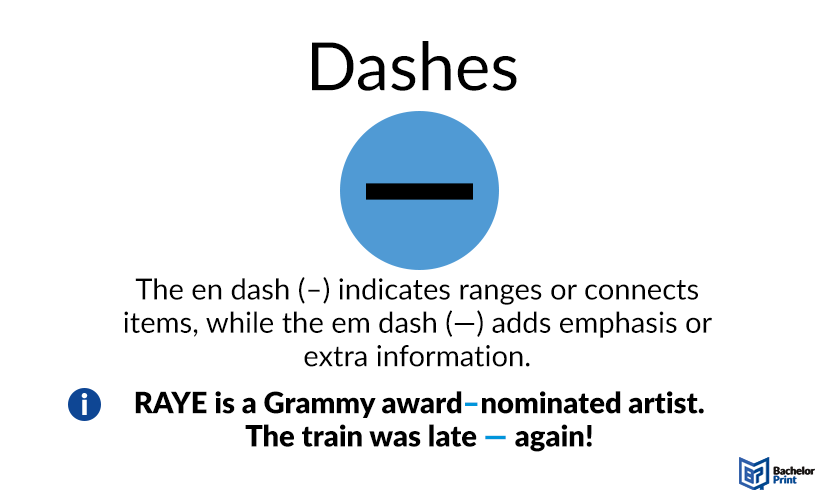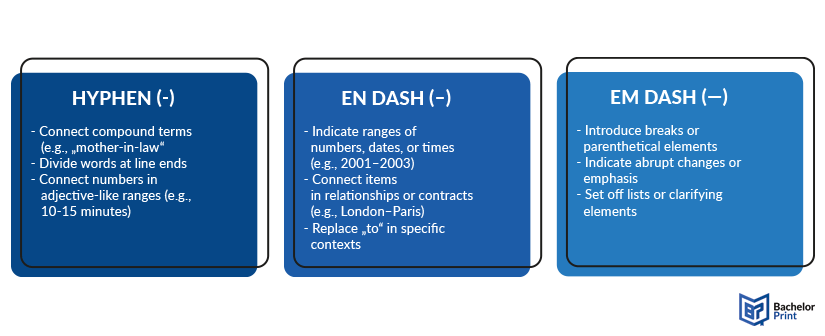
Dashes, integral to language rules and conventions, are versatile punctuation marks that introduce variety and precision to written communication. They can indicate interruptions, insert additional information, or denote ranges in numbers and dates. Understanding the correct usage of different types — like the em dash, en dash, and hyphen — can greatly enhance the clarity and one’s coherence and style of writing.
Definition: Dashes
Dashes, a type of punctuation, are little horizontal lines that float mid-line in a text. It is visually similar to an underscore (_), but underscores are placed at the bottom of the line. They can be used in place of commas, semicolons, and parentheses to break down the text into two parts. However, once you use dashes, avoid introducing these punctuation marks. The choice between using a single or a pair of dashes, and whether to use an en or em dash, varies with style guides. This reflects that their use is a matter of style, influenced by different rules in publications or academic writing. They are particularly useful for making additional information within a sentence, or, to clarify the sentence structure.

Examples of dashes
Here are some examples to illustrate the different types with spaces and without.
Although these punctuation marks can be used in different parts of a text body, there are some common mistakes you should avoid. For example:
You should not use a dash with a comma.
A common grammatical error is a failure to correctly space words before or after dashes.
Incorrect spacing of the first dash has resulted in a hyphen rather than a dash, which is similar to a hyphen, but a hyphen is shorter and is used to space words:
Em dash vs. en dash
There are two types of dashes used in writing with specific and distinct purposes, which are oftentimes interchangeably used with hyphens. Here’s how they differ:

The em dash (—)
The em dash (also called the “common dash”) is approximately as long as the letter m and is longer than the en dash. They often highlight extra information that is not relevant to comprehending the sentence. For this function, parentheses, and commas can also be used.
It is generally acceptable to write an em dash without spaces on either side, though some style instructions may require spaces. However, ensure your spacing is consistent throughout your work.
An em dash can also be used to illustrate censored or redacted information. Some quoted documents may also have missing parts, and the little line is used to represent the missing information.
The en dash (–)
The en dash is slightly shorter than the em dash, approximately the same length as the letter n. En dashes are used to show a range or a specific period. They can be used in place of “to” or “through” in a defined class.
An en dash can also connect two words in a phrase.
Note that in cases where a range is denoted by the phrases “from…. to…” and “between….and…”, retain the “and” phrase rather than introducing an en dash.
Printing Your Thesis With BachelorPrint
- High-quality bindings with customizable embossing
- 3D live preview to check your work before ordering
- Free express delivery
Configure your binding now!
Dashes in academic writing
Dashes are used in academic writing in several instances, which include:
To set off material for emphasis
To introduce a brief list within a sentence
To define a word
To mark a change in tone
FAQs
A dash is mainly used to introduce more information in a sentence. Most of the time, they highlight extra information that is not crucial to understanding the main sentence’s gist.
A single dash is commonly used to alert a reader to extra information in a sentence. A single hyphen, however, is shorter and is used to separate words in compound word structures.
An em dash is as long as the letter m and is used to show the beginning of the extra part of a sentence. The en dash is the same length as the letter n and is used in writing to show a range of numbers.
No, you cannot. It is grammatically wrong to use any type of dash with commas, as it leads to repetition and redundancy in your punctuation.
There are two kinds of dashes:
En Dash (-) to indicate ranges or to denote a connection or contrast between two things.
Em Dash (—) to set off a parenthetical element within a sentence for emphasis, an abrupt change in thought, or to introduce an item or list.